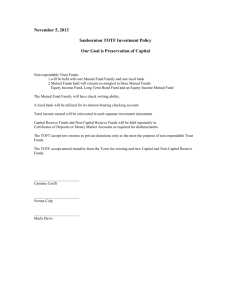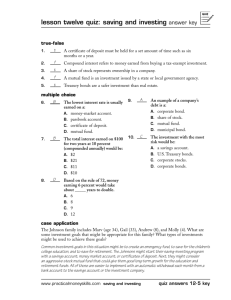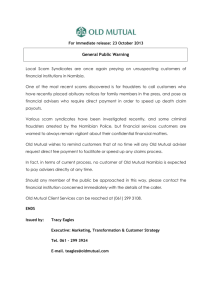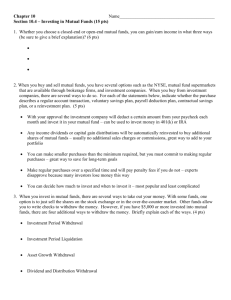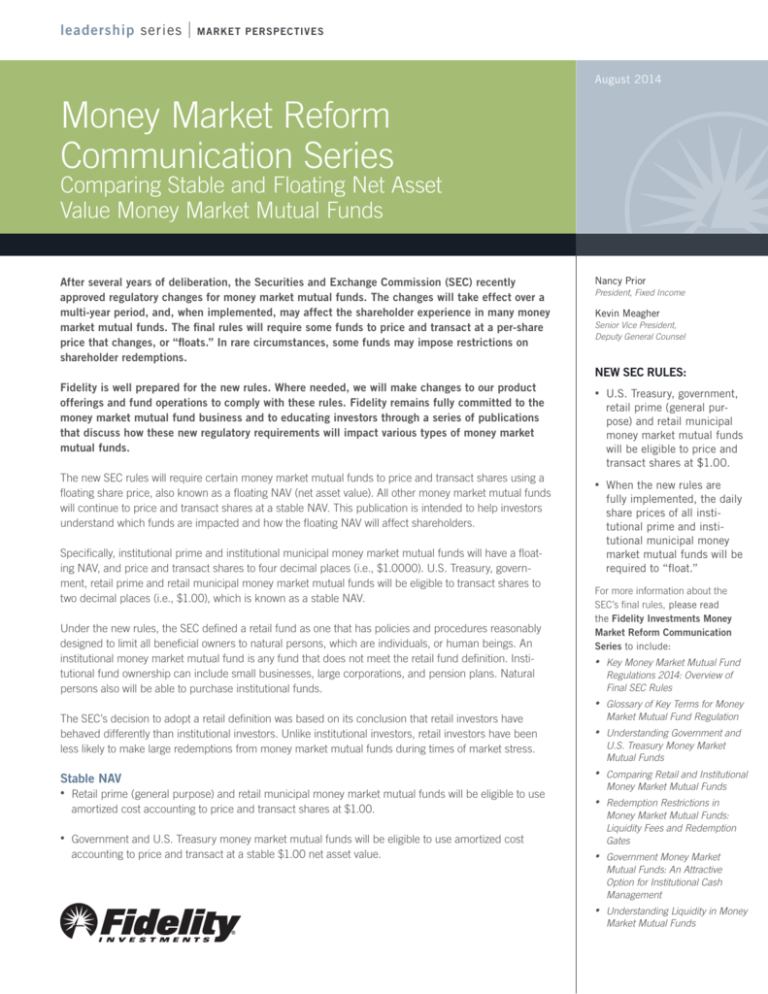
leadership series
MARKET PERSPECTIVES
August 2014
Money Market Reform
Communication Series
Comparing Stable and Floating Net Asset
Value Money Market Mutual Funds
After several years of deliberation, the Securities and Exchange Commission (SEC) recently
approved regulatory changes for money market mutual funds. The changes will take effect over a
multi-year period, and, when implemented, may affect the shareholder experience in many money
market mutual funds. The final rules will require some funds to price and transact at a per-share
price that changes, or “floats.” In rare circumstances, some funds may impose restrictions on
shareholder redemptions.
Nancy Prior
President, Fixed Income
Kevin Meagher
Senior Vice President,
Deputy General Counsel
NEW SEC RULES:
Fidelity is well prepared for the new rules. Where needed, we will make changes to our product
offerings and fund operations to comply with these rules. Fidelity remains fully committed to the
money market mutual fund business and to educating investors through a series of publications
that discuss how these new regulatory requirements will impact various types of money market
mutual funds.
The new SEC rules will require certain money market mutual funds to price and transact shares using a
floating share price, also known as a floating NAV (net asset value). All other money market mutual funds
will continue to price and transact shares at a stable NAV. This publication is intended to help investors
understand which funds are impacted and how the floating NAV will affect shareholders.
Specifically, institutional prime and institutional municipal money market mutual funds will have a floating NAV, and price and transact shares to four decimal places (i.e., $1.0000). U.S. Treasury, government, retail prime and retail municipal money market mutual funds will be eligible to transact shares to
two decimal places (i.e., $1.00), which is known as a stable NAV.
Under the new rules, the SEC defined a retail fund as one that has policies and procedures reasonably
designed to limit all beneficial owners to natural persons, which are individuals, or human beings. An
institutional money market mutual fund is any fund that does not meet the retail fund definition. Institutional fund ownership can include small businesses, large corporations, and pension plans. Natural
persons also will be able to purchase institutional funds.
•
U.S. Treasury, government,
retail prime (general purpose) and retail municipal
money market mutual funds
will be eligible to price and
transact shares at $1.00.
•
When the new rules are
fully implemented, the daily
share prices of all institutional prime and institutional municipal money
market mutual funds will be
required to “float.”
For more information about the
SEC’s final rules, please read
the Fidelity Investments Money
Market Reform Communication
Series to include:
• Key Money Market Mutual Fund
Regulations 2014: Overview of
Final SEC Rules
• Glossary of Key Terms for Money
Market Mutual Fund Regulation
The SEC’s decision to adopt a retail definition was based on its conclusion that retail investors have
behaved differently than institutional investors. Unlike institutional investors, retail investors have been
less likely to make large redemptions from money market mutual funds during times of market stress.
• Understanding Government and
Stable NAV
• Comparing Retail and Institutional
•
•
Retail prime (general purpose) and retail municipal money market mutual funds will be eligible to use
amortized cost accounting to price and transact shares at $1.00.
Government and U.S. Treasury money market mutual funds will be eligible to use amortized cost
accounting to price and transact at a stable $1.00 net asset value.
U.S. Treasury Money Market
Mutual Funds
Money Market Mutual Funds
• Redemption Restrictions in
Money Market Mutual Funds:
Liquidity Fees and Redemption
Gates
• Government Money Market
Mutual Funds: An Attractive
Option for Institutional Cash
Management
• Understanding Liquidity in Money
Market Mutual Funds
•
A stable $1.00 NAV has been a fundamental feature of money
market mutual funds, making these funds a convenient and
popular vehicle for managing cash, settling brokerage trades,
and facilitating a broad range of other financial transactions.
•
Under guidance issued by the U.S. Department of the Treasury
(Treasury) and the Internal Revenue Service (IRS), floating NAV
shareholders will be able to report a single net number for the
gains and losses experienced over the course of a year, rather
than reporting individual transactions. This will significantly
reduce the tax recordkeeping for shareholders.
•
The Treasury and the IRS have made it clear in their guidance
that sales of floating NAV money market mutual funds will not
be subject to the wash-sale rule.2
•
With the respect to accounting, the SEC stated its position that
floating NAV money market mutual funds will be considered a
“cash equivalent.”
•
The SEC also provided clarity that a floating NAV money
market mutual fund could be eligible for same-day settlement
by pricing fund shares multiple times within a single day.
Floating NAV
•
•
•
When the new rules are fully implemented, the daily share
prices of all institutional prime and institutional municipal
money market mutual funds will be required to “float.” This
means that instead of shares being priced at $1.00, as they are
today, the funds will be required to price and transact at a NAV
that uses four-decimal-place precision ($1.0000), a process
known as “basis-point rounding.”
Floating NAV money market mutual funds will not be permitted
to use amortized cost accounting.1
When a fund uses basis-point rounding to set its NAV, its
shareholders may experience a gain or loss if the per-share
value of the fund changes by 1/100th of a penny. For example,
if a shareholder owned 10,000 shares priced at $1.0000, a
1 basis point change in a floating NAV fund would result in a
gain or loss of $1.00.
Market value NAV: daily website disclosure
Within 18 months of the new SEC rule being finalized, each money
market mutual fund will disclose daily on its website, the fund’s:
•
Daily market NAV, reported out to four decimal places
($1.0000)
•
Daily and weekly liquid assets as a percentage of the fund’s
total assets
•
Net flows from the previous day
Floating NAV: tax, accounting and related matters
•
Once the new rules come into effect, shareholders in institutional prime and institutional municipal money market mutual
funds may experience gains or losses as the NAV changes.
Under existing tax law, any gains or losses could create
taxable events.
Authors
2
Nancy Prior
Kevin Meagher
President, Fixed Income
Senior Vice President, Deputy General Counsel
Nancy Prior is president of Fidelity’s Fixed Income division, where
she has strategic oversight of Fidelity’s Global Bond and Money
Market groups.
Kevin Meagher is Senior Vice President, Deputy General Counsel
for Fidelity Investments, where he is responsible for leading the
Fixed Income Legal Team.
Views expressed are as of the date indicated, based on the information
available at that time, and may change based on market and other
conditions. Unless otherwise noted, the opinions provided are those
of the authors and not necessarily those of Fidelity Investments or
its affiliates. Fidelity does not assume any duty to update any of the
information.
An investment in a money market fund is not insured or
guaranteed by the Federal Deposit Insurance Corporation or any
other government agency. Although the fund seeks to preserve
the value of your investment at $1.00 per share, it is possible
to lose money by investing in the fund.
Before investing, consider the funds’ investment objectives,
risks, charges, and expenses. Contact Fidelity for a prospectus
or, if available, a summary prospectus containing this
information. Read it carefully.
Investment decisions should be based on an individual’s own goals,
time horizon, and tolerance for risk.
Past performance is no guarantee of future results.
3
Endnotes
1
Floating NAV money market mutual funds will not be permitted to use
amortized cost accounting except to the extent that it is available to all
mutual funds.
A wash sale occurs when a security is sold at a loss and within 30 days
prior to or after that sale, a “substantially identical” stock or security, or
a contract or option is purchased by the same individual, the individual’s
spouse, or a company controlled by the individual.
2
Third-party marks are the property of their respective owners; all other
marks are the property of FMR LLC.
If receiving this piece through your relationship with Fidelity Financial
Advisor Solutions (FFAS), this publication is provided to investment
professionals, plan sponsors, institutional investors, and individual
investors by Fidelity Investments Institutional Services Company, Inc.
If receiving this piece through your relationship with Fidelity Personal
& Workplace Investing (PWI), Fidelity Family Office Services (FFOS), or
Fidelity Institutional Wealth Services (IWS), this publication is provided
through Fidelity Brokerage Services LLC, Member NYSE, SIPC.
If receiving this piece through your relationship with National Financial
or Fidelity Capital Markets, this publication is FOR INSTITUTIONAL
INVESTOR USE ONLY. Clearing and custody services are provided
through National Financial Services LLC, Member NYSE, SIPC.
694189.1.0
© 2014 FMR LLC. All rights reserved.


